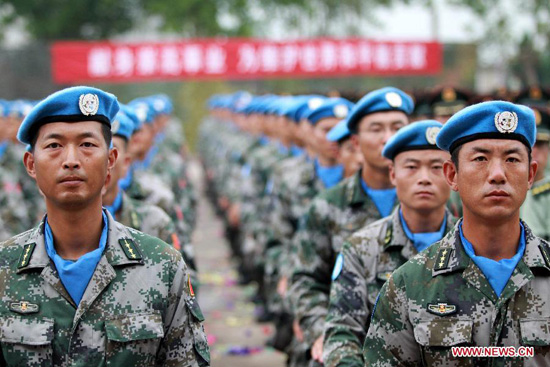Featured
Keeping Peace, Building Power: China & International Peacekeeping (Liveblog)
Recently, the Chinese government has made historical moves involving China’s role in international peacekeeping. Today’s seminar focuses on the China’s role within the international peacekeeping community.
Published
9 years agoon

Seminar: China’s Role in International Peacekeeping
Date & Place: Nov. 25, 2014, The Hague Institute for Global Justice
Organized by: Dutch Ministry of Foreign Affairs
Blogged by: Manya Koetse
Recently, the Chinese government has made historical moves involving China’s role in international peacekeeping. In early 2014, the PLA (People’s Liberation Army) send a motorized infantry brigade to Mali. In September this year, a 700-strong infantry troop was send to South-Sudan as part of a UN peacekeeping mission – the first Chinese battalion to participate in such a peacekeeping operation (GT 2014; ECNS 2014). The recent behavior of Chinese leaders in issues of international conflict contrasts with Chinese participation in peacekeeping operations in the 1970s and 1980s. Today’s seminar focuses on China’s role within the international peacekeeping society.
Introduction (14:00 GMT+1)
Peter Potman, Director Asian and Pacific Affairs Department (Netherlands Ministry of Foreign Affairs) is the first speaker on today’s seminar.
China as an actor in the international political arena is gradually gaining significance, Potman says, as its role in global politics is transforming: China is becoming more assertive. China’s position within international conflict situations is profoundly changing. Its role used to be one of non-interference, but is now changing as the political leadership is getting more involved in issues playing in Sudan or Syria.
Today’s seminar has two keynote speakers: Frans-Paul van der Putten from the Clingendael Institute and Dr. Jing Gu from the Institute of Development Studies. But first Christina Jansen shortly addresses the role of China today in international peacekeeping. Jansen recalls how she first arrived in China in 1978, and remembers how she would involuntarily cause a traffic jam because so many people would stare at this foreigner standing next to the road. “How China has changed!” Jansen says. The central question of today is: does the quick transformation of China as a nation also have implications for the international order in security issues, and if, how?
China and International Security (14:20 GMT+1)
Balance is crucial for China as an actor within international security issues, Van der Putten says. He states that China has to find its balance in different areas. First, it has to deal with the growing number of Chinese people and companies outside of China, and has to think about how to protect them without becoming over-involved and making the same ‘mistakes’ as western nations have made in the past. Secondly, it has to find its role in the international system where the national identity of China has to be communicated on an international level in such a way that it preserves the Chinese identity. Lastly, China also has to balance between its role as being one of the global powers and being one of the leaders within the developing world.
How does this translate to security issues? China already is a permanent member of the Security Council but is still looking for ways to strengthen its position. China finding its balance is noticeable in how it acts, Van der Putten states, not only as a member of the International Security Council but also as a leader in regional security organizations, where China increasingly is taking in an assertive position as a regional power.
“There’s a big difference between China’s principles and how it acts in reality.”
China and International Security (14:40 GMT+1)
China’s role within international peacekeeping cannot be compared to that of other nations, according to Jing Gu. China’s international peacekeeping framework should be seen within China’s development at large. What one can now discern, says Gu, is the difference between China’s principles and how it acts in reality. According to principles, the Chinese government strictly respects the sovereignty of other countries and has a non-intervention principle. But in reality, their principles turn out to be much more flexible than they are on paper.
Dr. Gu is convinced that one can never leave out the economic perspective when talking about China’s engagement in peacekeeping operations. Business plays a big role in China’s international development cooperation; the business sector is increasingly important for China in, for example, Africa. Western nations have to take this perspective in account when cooperating with China in international security matters.
“For China, ‘peacekeeping’ truly is about peace keeping, not about peace building.”
There are differences in what Western nations and China consider ‘international peacekeeping’. From the Chinese perspective, it is very much about actual ‘peace keeping’ and not ‘peace building’, Gu says: a major difference with what most western powers consider to be ‘peacekeeping’. Using force is not something Chinese leaders want to do, as non-interference is a high principle for the government. But, Gu stresses again, “principles are just principles; in reality these principles are very flexible, as we’ve seen in Africa.”
What can be done on the long term to involve China in international security collaborations? “It has to be taken case by case,” Gu says. It is not the right time for general talks about future collaborations and shared frameworks- step by step and case by case, China will become more involved in international peacekeeping, Gu predicts, as is happening in Sudan right now.
Discussion (15:20 GMT+1)
“Over the past 500 years there have been many power shifts that have not led to war,” panelist Tim Sweijs of The Hague Centre for Strategic Studies says. However, every transformation in global power systems do have major consequences. States in the international system start harboring different expectations as power relations shift. This is what is also happening as China starts behaving differently within the international arena and takes on a different role in security issues. Different political actors seem worried that China is concerned about protecting its own national interests. These “worries” are “suspicious,” Sweijs says, because: “are western powers not concerned about own national interests?”
In the conclusion of the seminar, Peter Potman stresses that nations in peace operations need to be fully aware of their differences before they can work on collaboration. There are often mutual and shared benefits to participate in a peacekeeping mission. While those shared interests are often clear, it is crucial to also elucidate the different interests in these operations. Who is participating for what reasons? Understanding these underlying motives helps in unraveling the web of international cooperation in global security issues – finally building on peacekeeping missions where all participating nations, including China, are looking in the same direction.
(This liveblog is now closed.)
References
ECNS. 2014. “Peacekeeping forum opens in Beijing.” ECNS, 15 Oct. http://www.ecns.cn/2014/10-15/138449.shtml (Accessed November 25, 2014).
Global Times (GT). 2014. “Peacekeeping can help China stand tall.” Global Times, 19 Nov. http://www.globaltimes.cn/content/892646.shtml (Accessed November 25, 2014).
Images
http://www.uscnpm.org/wp-content/uploads/2014/09/un.jpeg
Liu Rui/Global Times
Manya Koetse is the founder and editor-in-chief of whatsonweibo.com. She is a writer, public speaker, and researcher (Sinologist, MPhil) on social trends, digital developments, and new media in an ever-changing China, with a focus on Chinese society, pop culture, and gender issues. She shares her love for hotpot on hotpotambassador.com. Contact at manya@whatsonweibo.com, or follow on Twitter.

China Brands, Marketing & Consumers
Zara Dress Goes Viral in China for Resemblance to Haidilao Apron
Who’s gonna buy this Zara dress in China? “I’m afraid that someone will say I stole the apron from Haidilao.”
Published
10 hours agoon
April 19, 2024
A short dress sold by Zara has gone viral in China for looking like the aprons used by the popular Chinese hotpot chain Haidilao.
“I really thought it was a Zara x Haidialo collab,” some customers commented. Others also agree that the first thing they thought about when seeing the Zara dress was the Haidilao apron.

The “original” vs the Zara dress.
The dress has become a popular topic on Xiaohongshu and other social media, where some images show the dress with the Haidilao logo photoshopped on it to emphasize the similarity.

One post on Xiaohongshu discussing the dress, with the caption “Curious about the inspiration behind Zara’s design,” garnered over 28,000 replies.
Haidilao, with its numerous restaurants across China, is renowned for its hospitality and exceptional customer service. Anyone who has ever dined at their restaurants is familiar with the Haidilao apron provided to diners for protecting their clothes from food or oil stains while enjoying hotpot.
These aprons are meant for use during the meal and should be returned to the staff afterward, rather than taken home.

The Haidilao apron.
However, many people who have dined at Haidilao may have encountered the following scenario: after indulging in drinks and hotpot, they realize they are still wearing a Haidilao apron upon leaving the restaurant. Consequently, many hotpot enthusiasts may have an ‘accidental’ Haidilao apron tucked away at home somewhere.
This only adds to the humor of the latest Zara dress looking like the apron. The similarity between the Zara dress and the Haidilao apron is actually so striking, that some people are afraid to be accused of being a thief if they would wear it.
One Weibo commenter wrote: “The most confusing item of this season from Zara has come out. It’s like a Zara x Haidilao collaboration apron… This… I can’t wear it: I’m afraid that someone will say I stole the apron from Haidilao.”

Funnily enough, the Haidilao apron similarity seems to have set off a trend of girls trying on the Zara dress and posting photos of themselves wearing it.

It’s doubtful that they’re actually purchasing the dress. Although some commenters say the dress is not bad, most people associate it too closely with the Haidilao brand: it just makes them hungry for hotpot.
By Manya Koetse
Independently reporting China trends for over a decade. Like what we do? Support us and get the story behind the hashtag by subscribing:
Spotted a mistake or want to add something? Please let us know in comments below or email us. First-time commenters, please be patient – we will have to manually approve your comment before it appears.
©2024 Whatsonweibo. All rights reserved. Do not reproduce our content without permission – you can contact us at info@whatsonweibo.com.
China Arts & Entertainment
“Old Bull Eating Young Grass”: 86-Year-Old Chinese Painter Fan Zeng Marries 36-Year-Old Xu Meng
Online reactions to the news of Fan’s marriage to Xu Meng, his fourth wife, reveal that the renowned artist is not particularly well-liked among Chinese netizens.
Published
1 day agoon
April 18, 2024
The recent marriage announcement of the renowned Chinese calligrapher/painter Fan Zeng and Xu Meng, a Beijing TV presenter 50 years his junior, has sparked online discussions about the life and work of the esteemed Chinese artist. Some netizens think Fan lacks the integrity expected of a Chinese scholar-artist.
Recently, the marriage of a 86-year-old Chinese painter to his bride, who is half a century younger, has stirred conversations on Chinese social media.
The story revolves around renowned Chinese artist, calligrapher, and scholar Fan Zeng (范曾, 1938) and his new spouse, Xu Meng (徐萌, 1988). On April 10, Fan announced their marriage through an online post accompanied by a picture.
In the picture, Fan is seen working on his announcement in calligraphic form.

Fan Zeng announces his marriage on Chinese social media.
In his writing, Zeng shares that the passing of his late wife, three years ago, left him heartbroken, and a minor stroke also hindered his work. He expresses gratitude for Xu Meng’s care, which he says led to his physical and mental recovery. Zeng concludes by expressing hope for “everlasting harmony” in their marriage.
Fan Zeng is a calligrapher and poet, but he is primarily recognized as a contemporary master of traditional Chinese painting. Growing up in a well-known literary family, his journey in art began at a young age. Fan studied under renowned mentors at the Academy of Fine Arts in Beijing, including Wu Zuoren, Li Keran, Jiang Zhaohe, and Li Kuchan.
Fan gained global acclaim for his simple yet vibrant painting style. He resided in France, showcased his work in numerous exhibitions worldwide, and his pieces were auctioned at Sotheby’s and Christie’s in the 1980s.[1] One of Fan’s works, depicting spirit guardian Zhong Kui (钟馗), was sold for over 6 million yuan (828,000 USD).

Zhong Kui in works by Fan Zeng.
In his later years, Fan Zeng transitioned to academia, serving as a lecturer at Nankai University in Tianjin. At the age of 63, he assumed the role of head of the Nankai University Museum of Antiquities, as well as holding various other positions from doctoral supervisor to honorary dean.
By now, Fan’s work has already become part of China’s twentieth-century art history. Renowned contemporary scholar Qian Zhongshu once remarked that Fan “excelled all in artistic quality, painting people beyond mere physicality.”
A questionable “role model”
Fan’s third wife passed away in 2021. Later, he got to know Xu Meng, a presenter at China Traffic Broadcasting. Allegedly, shortly after they met, he gifted her a Ferrari, sparking the beginning of their relationship.

A photo of Xu and her Hermes Birkin 25 bag has also been making the rounds on social media, fueling rumors that she is only in it for the money (the bag costs more than 180,000 yuan / nearly 25,000 USD).
On Weibo, reactions to the news of Fan’s marriage to Xu Meng, his fourth wife, reveal that the renowned artist is not particularly well-liked among netizens. Despite Fan’s reputation as a prominent philanthropist, many perceive his recent marriage as yet another instance of his lack of integrity and shamelessness.

Fan Zeng and Xu Meng. Image via Weibo.
One popular blogger (@好时代见证记录者) sarcastically wrote:
“Warm congratulations to the 86-year-old renowned contemporary erudite scholar and famous calligrapher Fan Zeng, born in 1938, on his marriage to Ms Xu Meng, a 50 years younger 175cm tall woman who is claimed to be China’s number one golden ratio beauty. Mr Fan Zeng really is a role model for us middle-aged greasy men, as it makes us feel much less uncomfortable when we’re pursuing post-90s youngsters as girlfriends and gives us an extra shield! Because if contemporary Confucian scholars [like yourself] are doing this, then we, as the inheritors of Confucian culture, can surely do the same!“
Various people criticize the fact that Xu Meng is essentially just an aide to Fan, as she can often be seen helping him during his work. One commenter wrote: “Couldn’t he have just hired an assistant? There’s no need to turn them into a bed partner.”
Others think it’s strange for a supposedly scholarly man to be so superficial: “He just wants her for her body. And she just wants him for his inheritance.”
“It’s so inappropriate,” others wrote, labeling Fan as “an old bull grazing on young grass” (lǎoniú chī nèncǎo 老牛吃嫩草).
Fan is not the only well-known Chinese scholar to ‘graze on young grass.’ The famous Chinese theoretical physicist Yang Zhenning (杨振宁, 1922), now 101 years old, also shares a 48-year age gap with his wife Weng Fen (翁帆). Fan, who is a friend of Yang’s, previously praised the love between Yang and Weng, suggesting that she kept him youthful.

Older photo posted on social media, showing Fan attending the wedding ceremony of Yang Zhenning and his 48-year-younger partner Weng Fen.
Some speculate that Fan took inspiration from Yang in marrying a significantly younger woman. Others view him as hypocritical, given his expressions of heartbreak over his previous wife’s passing, and how there’s only one true love in his lifetime, only to remarry a few years later.
Many commenters argue that Fan Zeng’s conduct doesn’t align with that of a “true Confucian scholar,” suggesting that he’s undeserving of the praise he receives.
“Mr. Wang from next door”
In online discussions surrounding Fan Zeng’s recent marriage, more reasons emerge as to why people dislike him.
Many netizens perceive him as more of a money-driven businessman rather than an idealistic artist. They label him as arrogant, critique his work, and question why his pieces sell for so much money. Some even allege that the only reason he created a calligraphy painting of his marriage announcement is to profit from it.
Others cast doubt on his status as a Chinese calligraphy ‘grandmaster,’ noting that his calligraphy style is not particularly impressive and may contain typos or errors. His wedding announcement calligraphy appears to blend traditional and simplified characters.

Netizens have pointed out what looks like errors or typos in Fan’s calligraphy.
Another source of dislike stems from his history of disloyalty and his feud with another prominent Chinese painter, Huang Yongyu (黄永玉). Huang, who passed away in 2023, targeted Fan Zeng in some of his satirical paintings, including one titled “When Others Curse Me, I Also Curse Others” (“人骂我,我亦骂人”). He also painted a parrot, meant to mock Fan Zeng’s unoriginality.

Huang Yongyu made various works targeting Fan Zeng.
In retaliation, Fan produced his own works mocking Huang, sparking an infamous rivalry in the Chinese art world. The two allegedly almost had a physical fight when they ran into each other at the Beijing Hotel.

Fan Zeng mocked Huang Yongyu in some of his works.
Fan and Huang were once on good terms though, with Fan studying under Huang at the Central Academy of Fine Arts in Beijing. Through Huang, Fan was introduced to the renowned Chinese novelist Shen Congwen (沈从文, 1902-1988), Huang’s first cousin and lifelong friend. As Shen guided Fan in his studies and connected him with influential figures in China’s cultural circles, their relationship flourished.
However, during the Cultural Revolution, when Shen was accused of being a ‘reactionary,’ Fan Zeng turned against him, even going as far as creating big-character posters to criticize his former mentor.[2] This betrayal not only severed the bond between Shen and Fan but also ended Fan’s friendship with Huang, and it is still remembered by people today.
Fan Zeng’s behavior towards another former mentor, the renowned painter Li Kuchan (李苦禪, 1899-1983), was also controversial. Once Fan gained fame, he made it clear that he no longer respected Li as his teacher. Li later referred to Fan as “a wolf in sheep’s clothes,” and apparently never forgave him. Although the exact details of their falling out remain unclear, some blame Fan for exploiting Li to further his own career.
There are also some online commenters who call Fan Zeng a “Mr Wang from next door” (隔壁老王), a term jokingly used to refer to the untrustworthy neighbor who sleeps with one’s wife. This is mostly because of the history of how Fan Zeng met his third wife.
Fan’s first wife was the Chinese female calligrapher Lin Xiu (林岫), who came from a wealthy family. During this marriage, Fan did not have to worry about money and focused on his artistic endeavours. The two had a son, but the marriage ended in divorce after a decade. Fan’s second wife was fellow painter Bian Biaohua (边宝华), with whom he had a daughter. It seems that Bian loved Fan much more than he loved her.
It is how he met his third wife that remains controversial to this day. Nan Li (楠莉), formerly named Zhang Guiyun (张桂云), was married to performer Xu Zunde (须遵德). Xu was a close friend of Fan, and helped him out when Fan was still poor and trying to get by while living in Beijing’s old city center.
Wanting to support Fan’s artistic talent, Xu let Fan Zeng stay over, supported him financially, and would invite him for meals. Little did he know that while Xu was away to work, Fan enjoyed much more than meals alone; Fan and Xu’s wife engaged in a secret decade-long affair.
When the affair was finally exposed, Xu Zunde divorced his wife. Still, they would use his house to meet and often locked him out. Three years later, Nan Li officially married Fan Zeng. Xu not only lost his wife and friend but also ended up finding his house emptied, his two sons now bearing Fan’s surname.
When Nan Li passed away in 2021, Fan Zeng published an obituary that garnered criticism. Some felt that the entire text was actually more about praising himself than focusing on the life and character of his late wife, with whom he had been married for forty years.

Fan Zeng and his four wives
An ‘old pervert’, a ‘traitor’, a ‘disgrace’—there are a lot of opinions circulating about Fan that have come up this week.
Despite the negativity, a handful of individuals maintain a positive outlook. A former colleague of Xu Meng writes: “If they genuinely like each other, age shouldn’t matter. Here’s to wishing them a joyful marriage.”
By Manya Koetse
[1]Song, Yuwu. 2014. Biographical Dictionary of the People’s Republic of China. United Kingdom: McFarland & Company, 76.
[2]Xu, Jilin. 2024. “Xu Jilin: Are Shen Congwen’s Tears Related to Fan Zeng?” 许纪霖:沈从文的泪与范曾有关系吗? The Paper, April 15. https://www.thepaper.cn/newsDetail_forward_27011031. Accessed April 17, 2024.
Independently reporting China trends for over a decade. Like what we do? Support us and get the story behind the hashtag by subscribing:
Spotted a mistake or want to add something? Please let us know in comments below or email us. First-time commenters, please be patient – we will have to manually approve your comment before it appears.
©2024 Whatsonweibo. All rights reserved. Do not reproduce our content without permission – you can contact us at info@whatsonweibo.com.
Subscribe

Zara Dress Goes Viral in China for Resemblance to Haidilao Apron

“Old Bull Eating Young Grass”: 86-Year-Old Chinese Painter Fan Zeng Marries 36-Year-Old Xu Meng

Chengdu Disney: The Quirkiest Hotspot in China

Where to Eat and Drink in Beijing: Yellen’s Picks

Weibo Watch: Burning BMWs

The ‘Two Sessions’ Suggestions: Six Proposals Raising Online Discussions

A Snowball Effect: How Cold Harbin Became the Hottest Place in China

Jia Ling Returns to the Limelight with New “YOLO” Movie and 110-Pound Weight Loss Announcement

Top 9 Chinese Movies to Watch This Spring Festival Holiday

Party Slogan, Weibo Hashtag: “The Next China Will Still Be China”

From Pitch to Politics: About the Messy Messi Affair in Hong Kong (Updated)

Weibo Watch: Frogs in Wells

Looking Back on the 2024 CMG Spring Festival Gala: Highs, Lows, and Noteworthy Moments

Two Years After MU5735 Crash: New Report Finds “Nothing Abnormal” Surrounding Deadly Nose Dive

More than Malatang: Tianshui’s Recipe for Success
Get in touch
Would you like to become a contributor, or do you have any tips or suggestions? Get in touch here!
Popular Reads
-

 China Insight1 month ago
China Insight1 month agoThe ‘Two Sessions’ Suggestions: Six Proposals Raising Online Discussions
-

 China Insight3 months ago
China Insight3 months agoA Snowball Effect: How Cold Harbin Became the Hottest Place in China
-

 China Arts & Entertainment3 months ago
China Arts & Entertainment3 months agoJia Ling Returns to the Limelight with New “YOLO” Movie and 110-Pound Weight Loss Announcement
-

 China Arts & Entertainment2 months ago
China Arts & Entertainment2 months agoTop 9 Chinese Movies to Watch This Spring Festival Holiday




